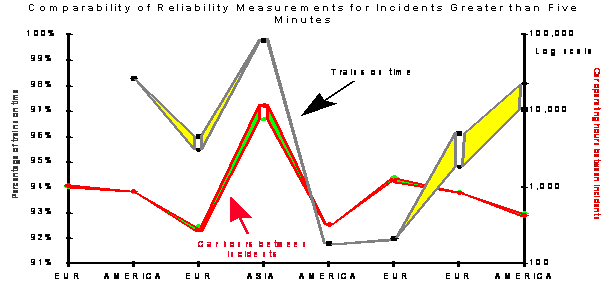CoMET - Community of Metros Benchmarking Study

Objective: to advance best practice through benchmarking within the heavy metro industry
In late 1994 / early 1995, five of the world’s leading heavy metro railways (LUL, RATP, NYCT, MTRC, TRTA and BVG) formed a benchmarking consortium to compare each system’s performance indicators and to use them to find pointers to best practice. Since then three more heavy metro systems - San Paulo, Mexico City and Tokyo have entered the group, which now includes all the largest metros in the world exceptMoscow. One of the fundamental aims of the project is to deliver results which can be used to implement change and help to formulate policy.
Methodology / Analytics: a detailed examination of data submitted, production of key performance indicators, and case studies for best practice
There are three strands to the project:
· Key performance indicators improve comparability and understanding, and give some cause and effect insights. They are pointers to which case studies are needed or would be beneficial to participants.
· Intrinsic Case Studies - part of the data collection and quality improvement programme, with (mainly qualitative) insights from interviews and observation of different practices - give some direction for strategic programmes.
· Optional Case Studies - more in-depth analytical studies with dedicated data collection - generate detailed implementation recommendations.
Results: Practical assistance to the participating metros in achieving implementation of best practice through benchmarking
The objective of this project is to assist the metros to identify and implement best practice using benchmarking analysis and case studies. The results to date are very positive:
· Capacity - Several systems are implementing operational changes to improve capacity and reliability. NYCT has already achieved a 4.5% increase in capacity and remain committed to a target of 17%, without any significant capital investment.
· Contracting Out - The lessons learned on contracting out are being shared and have been applied by several participating metros.
· Staffing Levels - Early work has indicated significant opportunities to improve cost effectiveness - implementation analysis is now underway.
· Reliability - The importance of reliability management has been demonstrated, resulting in significant changes in monitoring and management by several participating metros. Reliability-centred and proactive maintenance has been introduced and reductions of 18% achieved in cost and rolling stock reliability improvements of over 114%.
It is anticipated that significant recommendations for implementation will continue to be generated by the process. Some participants have already declared their intention to continue the collaboration over years to come.
THE RAILWAY TECHNOLOGY STRATEGY CENTRE in the CIVIL ENGINEERING DEPARTMENT, IMPERIAL COLLEGE, Project Manager, R.Hirsch, Director, W Steinmetz, Chairman, Prof. T Ridley